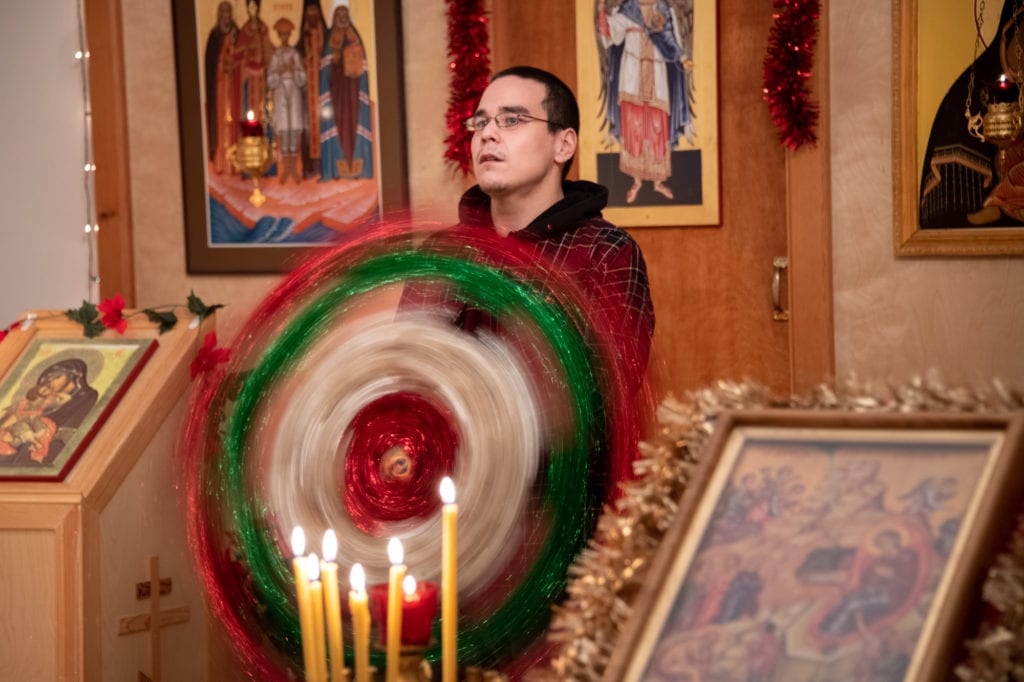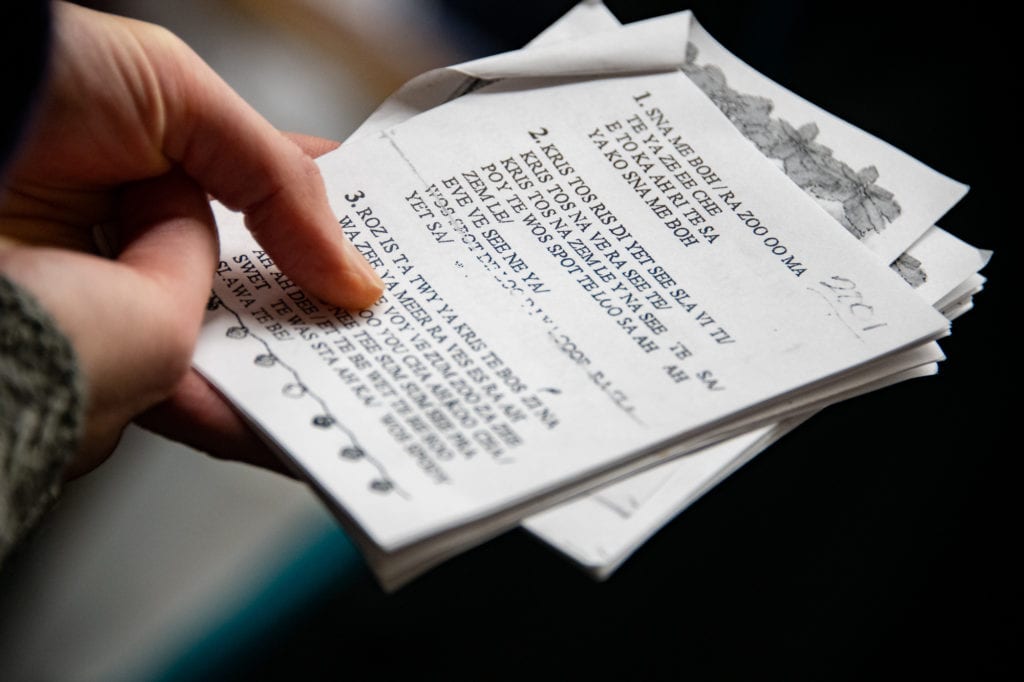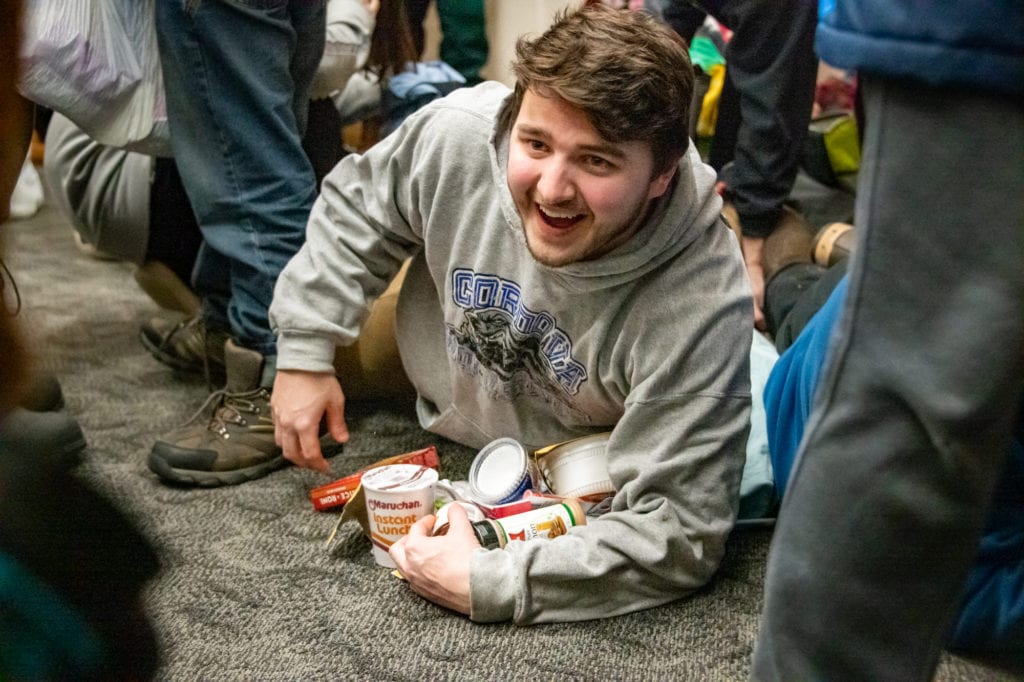
Despite its name, Alaska’s Russian Orthodox community has changed a lot. At St. Michael’s Russian Orthodox Church in Cordova, women once wore dresses and sat only on the left side of the church, while men sat to the right. Now, congregants sit where they like and wear what they please.
Darrel Olsen has been “starosta,” or church caretaker, for St. Michael’s off and on for decades. It’s a role that has assumed magnified importance, as an Orthodox priest only visits Cordova four times per year. Over time, Olsen has seen dresses and headscarves exchanged for down coats and Xtratuf boots, as well as other relaxations of protocol. For the most part, he doesn’t mind these changes. But there is one thing Olsen will never do: translate the church’s Christmas hymns into English.
Cordova’s Orthodox believers celebrate Christmas over three nights, beginning Jan. 7. On each night, participants move from venue to venue, chanting hymns before a garlanded Nativity star wielded by a designated star-twirler. These hymns are mainly in Church Slavonic and in Aleut, an Alaska Native language preserved through the 19th century with the help of Orthodox linguists. Today, Aleut remains critically endangered, with fewer than 100 speakers, according to studies by the University of Alaska Fairbanks. Slavonic itself was intermittently suppressed in the Soviet Union, but lives now as a liturgical language used in Russian Orthodox ceremonies across the world.
Putting the Aleut language to use helps preserve it, Olsen believes. Christmas participants are given handouts with phonetic renderings of hymns that allow them to sing convincingly in Aleut and Slavonic even if they don’t understand it. As Olsen sees it, a decision to abandon the endangered Aleut language shouldn’t be motivated by mere convenience.

“I’ve said, I don’t mind if we move Christmas to Dec. 25, but the church better be prepared to allow women to become priests,” Olsen said. “The women are the backbone of our church. They decorate, they clean up — they do everything. And it’s like that everywhere. I don’t mind if they change the Christmas date, but, you know what? For 2,000 years, Christmas has fallen on Jan. 7-9. If we’re just going to change it for convenience, let’s change other things.”
This year’s celebrations took congregants from Cordova Community Medical Center to Ilanka Cultural Center and private residences across Cordova. Hymns were led by Kenneth Eleshansky, who served as star-twirler. Once chanting concluded, gifts purchased by the host were distributed. These were a cut above typical Halloween treats, ranging from cherry cordials and Whitman’s Samplers to hand-knitted scarves, beauty products and cold, hard cash.
But Russian Christmas gifts aren’t arranged under a tree: they’re thrown into the air and fought over in a giant scrum resembling a cross between trick-or-treat and freestyle wrestling. Some participants come away with a single jar of Play-doh, while others emerge with 10,000 calories’ worth of candy under each arm. It’s the Matthew principle in action: “To everyone who has, more will be given, but as for the one who has nothing, even what they have will be taken away.”
“And it used to be a lot rougher,” Olsen said. “I mean, a lot rougher. It’s really calmed down a lot, which I appreciate … Once, at a home, they actually threw frozen moose meat out. We had to tell them, ‘Don’t throw it! Just slide it.’ ”
Though Christmas observances at St. Michael’s closely follow Orthodox traditions, it’s worth noting that this particular method of gift distribution is a Prince William Sound innovation.

Once the mainly good-natured skirmishing has concluded, the more successful participants may share their gifts. The mark of a good Christmas participant is a gracious and reverent attitude in spite of the imminent temptation of chocolatey plunder.
“Other years, I’ve seen kids come only for the stuff,” Olsen said. “Now, a lot of the kids who come are learning respect … They hand out the stuff they get and they share it with the elders. I was so honored and so pleased to see that.”
Cordova’s Orthodox community is relatively small, buoyed in the summer by the Eastern European cannery workers who stop by St. Michael’s to light a candle. However, non-Orthodox Cordovans show their support in other ways, such as leaving their Christmas lights up through Jan. 9.
“More and more, people call me and ask when they can take their Christmas decorations down,” Olsen said. “Now, you drive around town and you see houses with the lights still on. Growing up, that didn’t happen, but now it does. They acknowledge it and honor it with us.”





